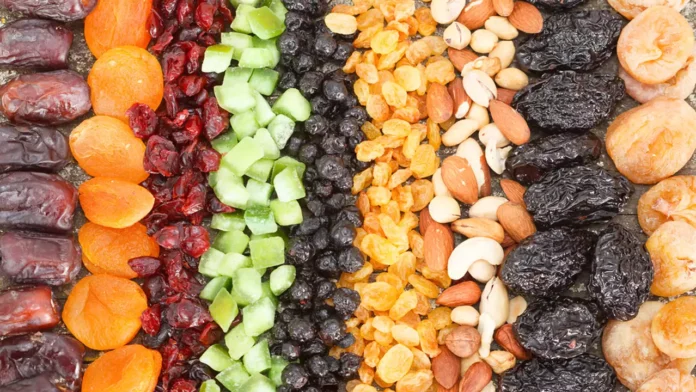Beating the summer heat often means seeking out cool and refreshing treats. While light salads, fruity smoothies, or even ice cream might come to mind, there’s another healthy option that packs a powerful nutritional punch: dried fruits. Not only are they delicious and satisfying, but they’re also brimming with essential nutrients that can keep you feeling your best during the hot weather. However, there are some things to consider before diving headfirst into a bag of dried goodies.
Dr. Ranga Santosh Kumar, a Consultant General Physician & Diabetologist at Yashoda Hospitals Hyderabad, shares insights on incorporating dried fruits into your summer diet. He emphasizes that dried fruits are nutrient-dense, offering vitamins, minerals, and fiber in a compact form. These nutrients are beneficial for maintaining energy levels, aiding digestion, and supporting overall health during the hot months.
Dr. Kumar highlights that dried fruits such as apricots, dates, and figs are rich in potassium, which helps regulate fluid balance in the body and can prevent dehydration. Raisins and prunes, with their high fiber content, support digestive health and can alleviate summer-related digestive issues.
However, Dr. Kumar advises moderation when consuming dried fruits. Despite their health benefits, dried fruits are calorie-dense and can contribute to weight gain if eaten in large quantities. Additionally, some dried fruits contain added sugars, which can negate their health benefits. He recommends opting for unsweetened varieties and being mindful of portion sizes.
Dr. Kumar also points out that dried fruits can be a convenient snack for those on the go, especially during summer outings or travel. Their long shelf life and portability make them an excellent choice for maintaining energy levels throughout the day. Pairing dried fruits with nuts can provide a balanced snack with protein and healthy fats, further enhancing their nutritional profile.
Incorporating dried fruits into your diet can be as simple as adding them to salads, yogurt, or oatmeal. They can also be blended into smoothies or used as a topping for desserts, offering a natural sweetness without the need for added sugars.
As with any dietary choice, balance and moderation are key. Dr. Kumar encourages individuals to enjoy dried fruits as part of a varied diet that includes plenty of fresh fruits and vegetables, whole grains, and lean proteins. By doing so, you can reap the benefits of dried fruits while maintaining overall health and well-being during the summer months.
Dr. Kumar further elaborates on the specific benefits of different types of dried fruits. For instance, apricots are a great source of vitamin A, which supports skin health and vision. In the summer, when skin can be particularly susceptible to sun damage, the beta-carotene in apricots can help protect and repair skin tissue. Dates, on the other hand, are high in iron and can be particularly beneficial for individuals with anemia, boosting energy levels and combating fatigue.
Another significant benefit of dried fruits is their antioxidant content. Dried blueberries, cranberries, and cherries, for example, are packed with antioxidants that help fight free radicals in the body. This is particularly important in the summer when increased sun exposure can lead to higher levels of oxidative stress. Incorporating these antioxidant-rich dried fruits into your diet can help mitigate some of the damage caused by UV radiation.
Despite these benefits, Dr. Kumar advises caution for individuals with certain health conditions. People with diabetes, for instance, should be mindful of their dried fruit intake due to the concentrated sugars. Even natural sugars can spike blood glucose levels if consumed in large quantities. He suggests that individuals with diabetes or those monitoring their sugar intake consult with their healthcare provider to determine appropriate portion sizes and types of dried fruits.
Dr. Kumar also emphasizes the importance of hydration when consuming dried fruits. Since dried fruits have had most of their water content removed, they can contribute to dehydration if not accompanied by adequate water intake. He recommends drinking plenty of water throughout the day and especially when consuming dried fruits to maintain proper hydration levels.
For those looking to diversify their summer diet, dried fruits can be combined with fresh fruits for a delightful mix of textures and flavors. This combination can provide a more balanced nutrient profile and enhance the overall eating experience. For instance, a salad with fresh strawberries, spinach, and dried cranberries can offer a refreshing and nutritious meal.
Incorporating dried fruits into homemade energy bars or trail mixes is another excellent way to enjoy their benefits. These snacks can be tailored to personal preferences, ensuring a healthy and satisfying option that’s perfect for summer hikes, beach days, or picnics.
While dried fruits are incredibly versatile, Dr. Kumar advises paying attention to the quality and source of the dried fruits. Organic and unsulfured varieties are preferable, as they are less likely to contain harmful preservatives and additives. Reading labels carefully and choosing high-quality products can maximize the health benefits while minimizing potential risks.

